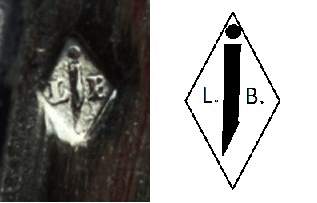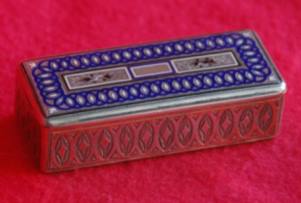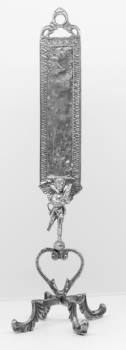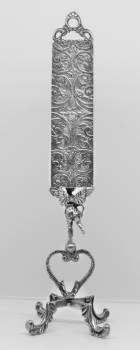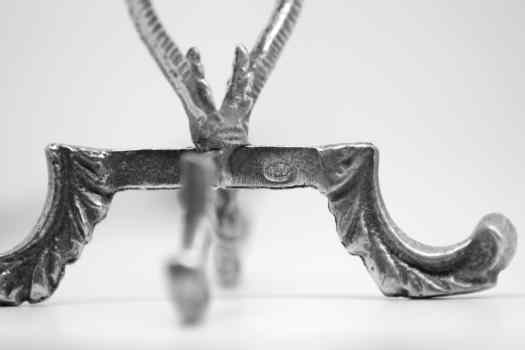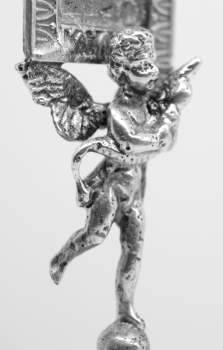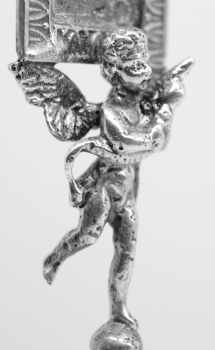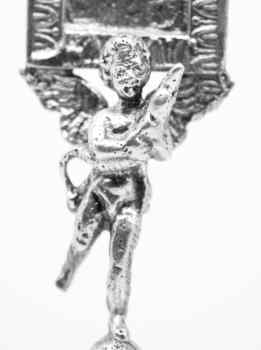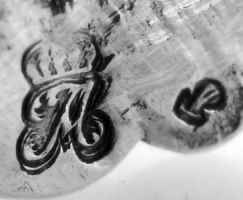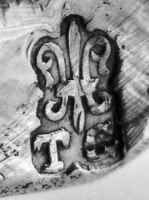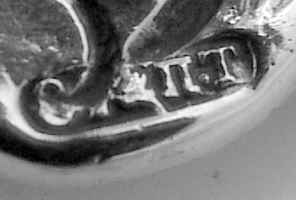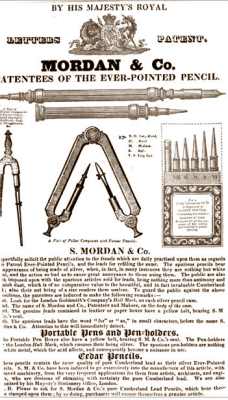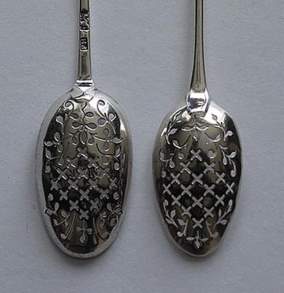
David McKinley presents:
The Significance of Mote Spoon Piercing

I have recently been made aware of misunderstandings in
the minds of some collectors of English silver plate
concerning the piercing of mote spoons which has led to
the belief that these little spoons were not entirely
English in origin and it would seem appropriate
therefore to say a few words on this subject.
There is no evidence of the existence of mote spoons
anywhere in the world until they appeared in London in
the late 17th century when they were known as "long tea
strainer spoons". Although they were in use in
connection with tea drinking for about a century it has
still not been established for certain how they were
used, but what is known is that the original examples
were utilitarian in design with nothing but simple holes
drilled through their bowls thus allowing the straining
which their name implied.
By the turn of the century these simple holes had given
way to quite decorative design and this was experimented
with throughout the 18th century. However to date no
evidence has been discovered to suggest that any of this
experimentation originated outside London although a few
of these spoons were made in America and some may even
have been made in Dublin.......
click here

|
Welcome to new ASCAS members:
Inga Vala Birgisdóttir - Iceland
Andrea Boschi - Italy
Hugo Cavendish - England UK
Bob Davis - Australia
Claude Guilloteau - France
Anthony House - New Zealand
Aland Lydell - Australia
Louise W. Phillips - USA
Jose Santiago - USA
Douglas Shand - Canada
Kim Yurchison - USA
Claudio Morelli writes:
... am looking for information on this object whose use is a
mystery to me. It is 17 cm. high, the size of the plate is 8x2 cm, the weight is 45 gr.
Thank you
Claudio Morelli
Michael Carter writes:
I fear that the marks in the three photos Marco posts are
fakes.
The crowned A in the first photo looks like the Parisian charge
mark used from 1768-1774, but the small mark next to it doesn't
correspond to any of the discharge or other general marks for
that period that I'm aware of. Also, the V-shape of the
cross-bar in the A is not consistent with other examples I have
seen.
The second photo seems to show a maker's mark (large
fleur-de-lys with the initials TG underneath). Again, this is
not consistent with the style of Parisian maker's marks for this
period.
The third photo doesn't look like an 18th century hallmark at
all.
Michael Carter
In this column we presents a page obtained from makers'
brochures, books, auction catalogs, advertising or whatever
other printed paper, related to silver, that may be of interest
for ASCAS members.
The images will be published at a "low resolution" level and for
private and personal use only
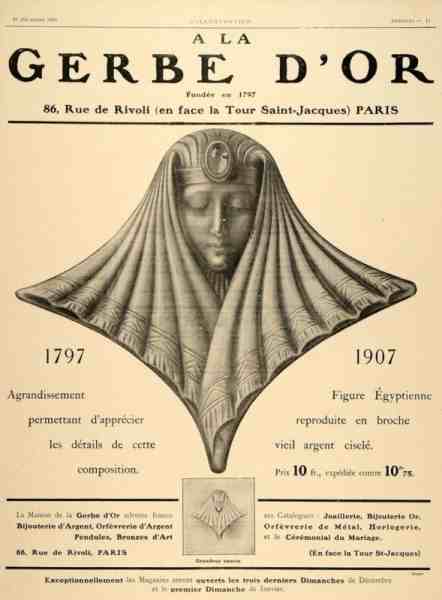
|
This month ASCAS presents an ancient advertisement
of À la Gerbe d'Or, Paris
À LA
GERBE D'OR
fondée en 1797
The firm was active at 86, Rue de Rivoli, Paris
Bijouterie d'Argent, Orfèvrerie d'Argent, Pensules,
Bronzes d'Art
|
"A WORD per MONTH"
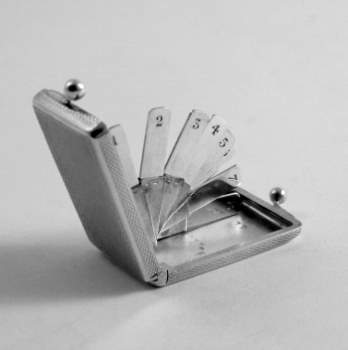
SHOTGUN PLACE FINDER
SHOOTING FIELD PLACE FINDER
BUTT MARKER
A device used to choose the first shooting position
in a game shoot.
The most common shape is similar to a Vesta case
containing until 10 numbered ivory pegs, but examples
are known in the shape of a cartridge or a flask
containing numbered balls....
more
|
"A SILVERSMITH per MONTH"
|
|
SAMPSON MORDAN - S. MORDAN & CO - S. MORDAN & CO LTD
Sampson Mordan (1870-1843),
apprentice and assistant of the mechanic John Bramah,
established his own business in 1815.
The first patent for a "metal pencil with an internal
mechanism for propelling the graphite 'lead' shaft
forward during use" was obtained in 1822 (his
co-inventor was John Isaac Hawkins).
In 1823 Mordan bought out the rights of Hawkins,
entering his first mark as "smallworker" in London Assay
Office on 9 June 1823 (SM oblong). In 1824 he entered in
partnership with Gabriel Riddle, registering a new mark
(SM.GR) in London Assay Office.
The partnership with Riddle was dissolved in 1836 and he
continued the business as S. Mordan & Co. Sampson Mordan
died in 1843 and the business was taken over by his sons
Sampson (Jr) and Augustus. They were later joined by
Edmund George Johnson and Zachariah Watkins who retired
in 1879.
After the death of Sampson Mordan (Jr) his share of the
business passed to his brother Augustus, joined as
partner in 1890 by Harry Lambert Symonds.
In 1898 the company was converted to a limited liability
company under the name of S. Mordan & Co Ltd.
In 1933 the distribution rights on the propelling pencil
business were given to L. G. Sloan Ltd, and in 1941,
following the destruction of the factory by enemy
bombing, the patents were sold to Edward Baker. The firm
went into voluntary liquidation in 1952.....
more
|
"A CREST per MONTH"
In this column we present images and
descriptions of Crests and Mottoes of British, Irish and
Scottish families as engraved on silver items.
BENNIE - BENNY - BENZIE - BINNIE
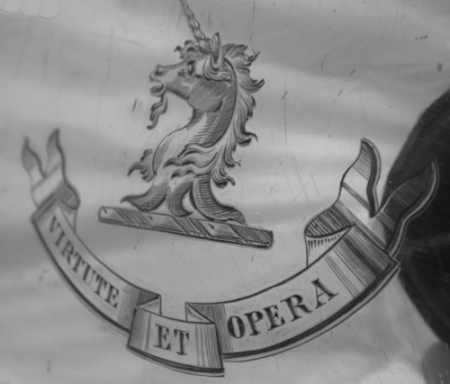 |
Scottish families.
The crest is described as "horse's head, bridled".
The Latin motto is Virtute et Opera (By virtue
and deeds).
The crest was found on silver plate meat cover bearing
an unidentified maker's mark
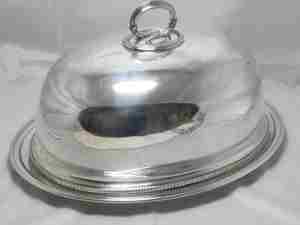
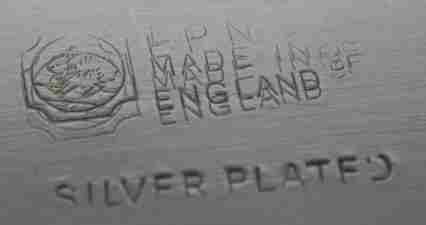
|
Closing our JUNE 2013 edition of ASCAS
Newsletter I hope you have appreciated its content.
Your comments, suggestions and advice will be of great help.
My thanks to Riccardo Bonardi, Michael Carter, David McKinley
and Claudio Morelli for their precious contributions.
Giorgio Busetto
Secretary
DISCLAIMER AND PRIVACY POLICY
ASCAS is a community of people having a common
interest in antique silver.
It is a non-profit association without commercial links.
Membership is open to whomever has a true interest in
this subject matter.
ASCAS has no real property and no fees are requested nor
accepted from members.
ASCAS keeps in touch with its members only through
periodical newsletters, e-mails and web-site updating
and ignores and is not responsible for any other
activity pursued by its members.
Likewise, ASCAS is not responsible for opinions,
evaluation and images displayed, and in any form
published or supplied for publication, by its members
who, in any case, maintain the property of their works
and assure the respect of national and international
legislation about Intellectual Property.
ASCAS does not have the full addresses of its members (only
town, country and e-mail address are requested for
membership).
ASCAS handles and protects with care its members' e-mail
addresses, will not disclose the addresses to third
parties, will use this information only to reply to
requests received from members and for communications
strictly related to its activity.
These rules are expressly accepted by submitting the
membership request.
|
|
 newsletter
# 109 June 2013
newsletter
# 109 June 2013






